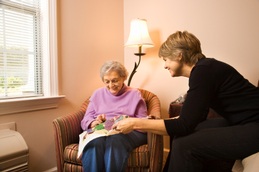Seeing the person behind the dementia is ‘perhaps the most crucial aspect of care’

Helping a person to live well with dementia does not only mean treating the illness, but ensuring their physical and mental wellbeing is maintained to allow them to continue to have fulfilling life experiences.
This is the message Red & Yellow Care are promoting through the report ‘ A good life with dementia’ which champions living in the moment and taking a more rounded holistic view to the individual behind the illness.
The report was commissioned by private care provider Red & Yellow Care and written by independent research agency ESRO in association with the Alzheimer’s Society and included the findings from over 80 people with dementia.
With the aim of tackling stigmas attached to the illness, the report has created six areas to help people lead good lives with dementia, including respecting identity and promoting spontaneity. Creators want the report to be seen as a springboard to create a more hopeful outlook on the dementia debate.
Dr Nori Graham, medical director of Red & Yellow Care, said: “The areas highlighted in the Red & Yellow Care report are not a set of rules and should not be treated as such. However sometimes dementia can be pictured so negatively, whereas in actual fact people can still enjoy a quality of life by ensuring both their mental and physical health is cared for as well as the illness.”
Treated differently
When someone is diagnosed with dementia, the diagnosis can provide key answers to someone’s concern about their health problems. However, it was found people with dementia were too often finding their other health needs were not being addressed, with some health professionals readily blaming unrelated health issues on the dementia.
One interviewee described their experience of the care system, in their role as a carer. Tony, who cares for Kate said: “Once she was diagnosed with dementia, it was like people saw it being not worth the bother to treat. But I could see her in pain, and it was increasingly preventing her from doing things she loved.”
Specific areas where people with dementia were sometimes treated differently to a person without the illness, included dental health and mobility issues.
Dr Graham said: “All Red & Yellow Care professionals have in mind that the most important principle of care is to maintain the person’s health, not treating just the illness but making sure the whole person is fit and well in order to enable them to take advantage of the opportunities we can give to them.
“It is vital not to blame everything on dementia and be aware that people can still continue to enjoy the pleasures they have been able to throughout their life.”
George McNamara, head of policy and public affairs at Alzheimer’s society said: “This report shows that with the right care and support people can live well with dementia. However, sadly we know this is not the reality for many. We need a step change in dementia care and support to overcome obstacles and barriers to living well focused on increased awareness, timely diagnosis and more personalised care.
“All of us have a part to play to ensure a good life can be had with dementia.”
Living in the moment

Sensory pleasures such as listening to something from their favourite music collection or eating something enjoyable can help someone with dementia to continue getting enjoyment from activities and maintain their sense of own personal identity.
These things can help home carers to bond with the person who they are caring for by learning about their personal choices and interests. By talking to family members, home carers could learn what kinds of activities might be the most appropriate activities for the person they are caring for.
Dr Graham said: “It is important to bear in mind that the course of the illness is a long one, and towards the later stages of the disease it can become much more of a challenge to enable people to have experiences they can enjoy. However things like eating or music can still be enjoyable, even though they cannot carry on doing some things they used to be able to do.
“In the early, middle and even late stages of the illness, including the person in everyday activities is important as far as possible. “A couple were able to go to dinner with the person’s relatives, and although sometimes there can be embarrassment which comes from whatever might happen due to their person’s illness, friends and family adapted and the couple were able to enjoy being out together.
“Although the wife, who has dementia, didn’t contribute to the conversation, she could smile and hear everything going on alongside her husband.
“Sometimes people feel that with someone with dementia can’t be taken anywhere and so become isolated, but depending on a person’s personality, someone with dementia can carry on having good experiences despite their illness.”
Personal identity
Over 90 per cent of people in a survey of 2,300 UK adults claimed ‘being independent’ was important to happiness, and was a vital element in helping people with dementia to lead fulfilling lives.
The report wants carers to prevent people with dementia from becoming ‘the safest humans who ever lived’ and work to empower them to be able to continue carrying out some independent activities through a sharing of responsibility between home carers, care organisations and the person with dementia themselves.

One carer interviewed in the report said: “I know things could go wrong, I’m not stupid, but riding his motorbike gives him independence and makes him happy.”
Red & Yellow Care provides specialised dementia care from diagnosis to extensive care form trained health care professionals.
Founding director of Red & Yellow Care, a private company which provides care and support, Dr Bahbak Miremadi said: “We need to get back to core principles if we’re going to enable people with dementia to see past their fear and make the most of what if potentially a long, rich and rewarding time of life.”
Dr Graham said: “Risk itself is unimportant. What is important is people with dementia can do things they enjoy even if this involves a modicum of risk eg if an individual is well known in a neighbourhood and local shops it should be possible for him / her to go out alone with some mark of identity.
“The crucial thing is that all activities that might involve risk are fully discussed with the person with dementia, relatives and staff together before they are undertaken. The sharing of responsibility reduces the stress for everybody.”
With the number of people with dementia expected to rise to over one million by 2021, the need for informed information and advice about helping someone to live well with dementia will become a vital debate for the whole community and will be necessary to respond well to the impact of an aging society.
Latest Features News
 28-Nov-19
2019 Election: Labour pledges £10.8 bn for free personal care while Boris Johnson sidelines social care
28-Nov-19
2019 Election: Labour pledges £10.8 bn for free personal care while Boris Johnson sidelines social care
 18-Oct-19
Podcast: Wendy Mitchell and dementia: 'My biggest fear is not knowing who my daughters are'
18-Oct-19
Podcast: Wendy Mitchell and dementia: 'My biggest fear is not knowing who my daughters are'
 30-Sep-19
World's oldest diver aged 96 says 'never accept the fact you are getting old'
30-Sep-19
World's oldest diver aged 96 says 'never accept the fact you are getting old'
 27-Sep-19
Exclusive: Care minister backs care workers' call for time off to grieve and attend funerals
27-Sep-19
Exclusive: Care minister backs care workers' call for time off to grieve and attend funerals
 20-Sep-19
Podcast: Gyles Brandreth urges care workers to learn poetry with elderly
20-Sep-19
Podcast: Gyles Brandreth urges care workers to learn poetry with elderly